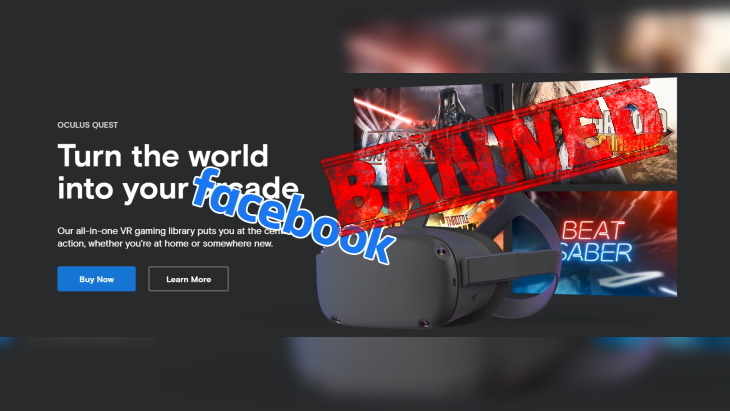
Facebook have confirmed those who violate their Community Standards and have their account banned “may also lose access” to their Oculus games.
As previously reported, Oculus announced that users would need to merge their account with a Facebook account from October 2020. If a user does not merge their accounts, they continue using their Oculus account for two years (with support for those accounts ending January 1st 2023).
Judging by the comments to both the tweet and the blog post– users were not happy. Many accused Facebook of inflating their user numbers via merging accounts (or users having to create new ones), and concerns over the privacy of the social media platform.
Several have stated they will switch to competitors, or demand a refund [1, 2, 3, 4, 5]. One user even prompted a response from VR rival HTC Vive on Twitter.
Now, Road to VR reports users will lose access to their Oculus games if they violate Facebook’s Community Standards. A Facebook spokesperson made the following statement to Road to VR.
“If you log in using your Facebook account or merge your Oculus and Facebook accounts and violate the Facebook Community Standards, Conduct in VR Policy or other terms and policies on any of our platforms your access to or use of Oculus products may be impacted. If your account is fully disabled as a result of this violation you may also lose access to your [games and content]. We are committed to keeping all of our platforms safer.”
Road to VR also report that permanent bans would be reserved for (in Road to VR’s words) “the most egregious violations.” Less violations could lead to suspensions which would (in Road to VR’s words) “restrict the use of Oculus headsets for up to thirty days.”
Other violations would include using a fake name or date of birth. The spokesperson claimed fake accounts would be flagged, meaning users would have to resolve the violation before regaining full access to the headset.
Even so, Road to VR reports “the company says that users can choose a pseudonym to associate with their VR activities and maintain a list of VR friends that is separate from their Facebook friends.”
The phrasing of the statements also do little to inspire confidence. “Restrict” may mean anything from losing any ability to playing any Oculus games, or that social and online multiplayer features would be disabled.
Asked for further details, such as if suspended accounts could play Oculus offline, the spokesperson told Road to VR that many details had to be worked out. More details will be revealed in October.
The Community Standards rules are designed to prevent harmful content being shared online, such as abuse and scams. However, Facebook has fallen under criticism for stifling free speech, and relying on automated bots to detect violating content (with false-positives).
There have also been claims of censoring whistle blowing (or removing unfounded conspiracy theories), and a bias against those with conservative political beliefs. This is also true of Twitter.
Twitter has tried desperately to curb abusive accounts, and prevent users from being “dunked on”- no matter the reason. These have included limiting an abusive tweet’s visibility, allowing users to control who can reply to them, and even changing the default “egg avatar” due to its association with harassment.
The former- better known as shadow banning- even resulted in Twitter CEO Jack Dorsey having to testify to the US House Energy and Commerce Committee. This was due to allegations of censorship, especially aimed at those with republican beliefs. Twitter’s terms of service (as of January 2020) effectively wrote shadow banning into their terms [1, 2, 3].
On May 28th, United States President Donald Trump signed an executive order on “Preventing Online Censorship,” after Twitter marked one of his tweets as “deceptive.” President Trump had expressed concern that mail-in ballots “will be anything less than substantially fraudulent.”
In summation, the executive order ascertains that social media is the modern “public square.” As such they would lose their protections from being liable for what users post, if they use “their power over a vital means of communication to engage in deceptive or pretextual actions stifling free and open debate by censoring certain viewpoints.”
This is Niche Gamer Tech. In this column, we regularly cover tech and things related to the tech industry. Please leave feedback and let us know if there’s tech or a story you want us to cover!